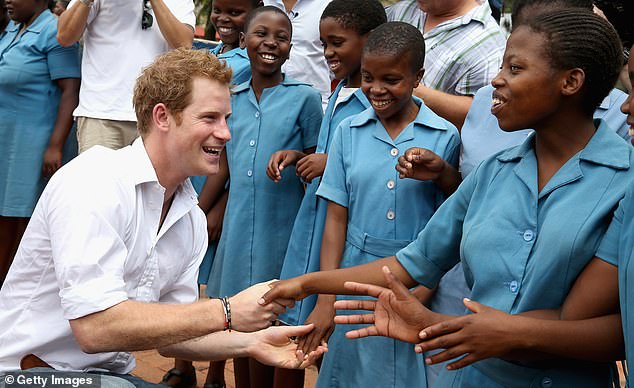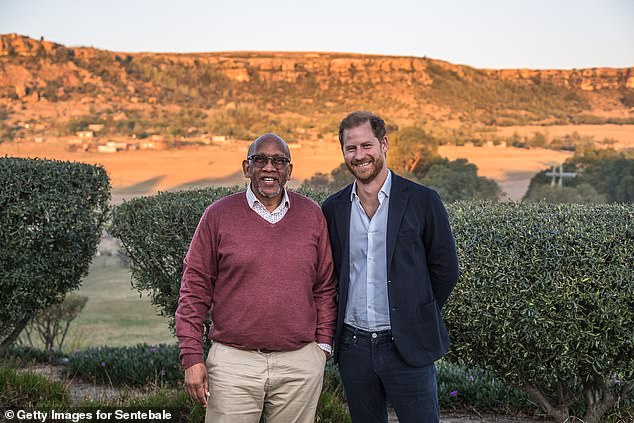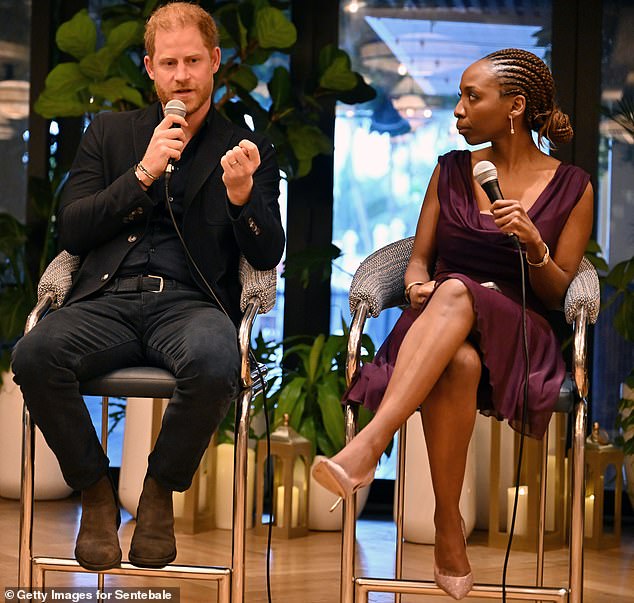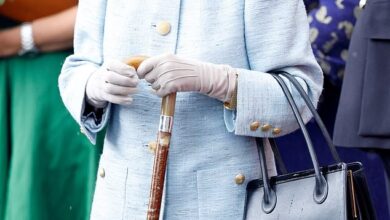BRYONY GORDON: The Harry I know will be heartbroken at having to walk away from the charity that was his first love

The thing I have always admired about Prince Harry – the thing that makes me raise my head above the parapet to stick up for him time and time again – is that he cares.
He really, really cares.
I knew this from the moment I met him, almost ten years ago now. It was at an event to launch Heads Together, the charitable campaign he had created with his brother William and sister-in-law Kate – now Prince and Princess of Wales – to get people talking about mental health.
In a world where it feels as if everyone is talking about their feelings, it’s hard to remember how genuinely groundbreaking this moment was: three members of the most famously buttoned-up family, telling those with mental illness they weren’t alone. They weren’t forgotten. They were welcome, and wanted.
I had been invited because I’d been open about my own mental illness, writing extensively about the Obsessive Compulsive Disorder (OCD) that had left me in terrible fear since childhood. I’d also recently set up a peer support group, Mental Health Mates, that had started to offer walks and get-togethers to others suffering from mental illness.
As I stood there in London‘s Olympic Park, chatting to them openly about so many often ignored mental health conditions, I remember being struck by how wholeheartedly the three young royals were committed to this cause. This was not a case of them blithely putting their names to some passing fad in the hope of winning brownie points with the nation.
Over the next year, I did a lot of work with them, and learnt with each passing meeting that they lived, breathed and slept Heads Together.
But it was Harry, in particular, with whom I really bonded. Our conversations were sometimes silly, sometimes serious, always sincere.

Harry – pictured meeting orphans in Lesotho through his work with Sentebale – has always endeavoured to use his position to shine a light on things that might otherwise stay lurking in the dark, writes Bryony Gordon

Harry co-founded the charity in 2006 with his friend, Prince Seeiso of Lesotho, after spending time in the country during his gap year
He chatted about dark times with the candour of someone who’d been through them personally. It was this that led me to ask if he’d consider being the first guest on a podcast I was about to start – one in which interviewees spoke about their own mental health.
In classic Harry style, he rose to the challenge, and so it was that he finally opened up publicly about the awful grief he had tried to ignore after his mother died.
For Harry, it was simple: if he had given one boy permission to cry, one child permission to grieve, one man permission to ask for help, then he had done his job.
I believe that has always been his motivation: to use his position to shine a light on things that might otherwise stay lurking in the dark. It’s what makes him tick, what enables him to make sense of the often nonsensical world he was born into.
And it’s why I know that the troubles currently engulfing his charity Sentebale will be heartbreaking for him. Because just as he cared deeply about Heads Together, and just as he is devoted to the injured veterans he serves through the Invictus Games, he is absolutely committed to helping children in southern Africa who have been affected by HIV.
He co-founded the charity in 2006 with his friend, Prince Seeiso of Lesotho, after spending time in the country during his gap year, and witnessing the terrible ravages of Aids on the population.
Sentebale is, in many ways, his first love. It is the project he has been with for the longest, the one that came before all the others – the one he founded in memory of his darling mother.
How heartbreaking then that Harry and Prince Seeiso have found themselves resigning as patrons of the charity, in solidarity with the board of trustees who all quit in protest at the ‘untenable’ leadership of Sophie Chandauka, the chair of Sentebale.

The prince with board chair Sophie Chandauka, right, who describes herself as a ‘whistleblower’ and claimed she has exposed ‘poor governance, weak executive management’

Prince Harry and Meghan attend the Royal Salute Polo Challenge as part of a Sentebale fundraiser in April 2024
In response, Chandauka has described herself as a ‘whistleblower’ and claimed she has exposed ‘poor governance, weak executive management … bullying, harassment, misogyny and misogynoir [discrimination against black women]’, while also reporting the trustees to the Charity Commission and filing a lawsuit against the organisation in the High Court.
It seems extraordinary, but in my experience this kind of in-fighting is all too common when it comes to the third sector. Voluntary work naturally attracts lots of empathetic people such as Prince Harry, but unfortunately, it also attracts those with far less honourable intentions.
During the almost ten years I’ve spent formalising Mental Health Mates as a not-for-profit organisation, I’ve heard stories from other founders about behaviour that is far from philanthropic – of the sort of in-fighting and backbiting that would make politicians and bankers blush.
For every ten people who are drawn towards the third sector to give back, it seems there’s at least one who’s only there to take.
The most obvious example of this comes courtesy of Hannah Ingram-Moore, who personally pocketed money donated to the Captain Tom Foundation – set up in her late father’s name.
Meanwhile, the supermodel Naomi Campbell is currently appealing a five-year ban that prevents her from running a charity. Campbell claims she was unaware of the financial misconduct at Fashion For Relief, that led to tens of thousands of pounds being spent on luxury hotel rooms, spa treatments, and even cigarettes. The 54-year-old claimed last month that she was the ‘victim of fraud and forgery’ and a ‘concerted deception’ carried out by a fellow trustee.
The Charity Commission are kept busy. Last year, the founders of an organisation backed by Sir Tony Blair were disqualified by the commission after a newspaper investigation found that money meant for children was instead spent on designer outfits to wear to fundraising events. Sharon Doughty and her partner Neil Evans are now appealing the decision, which came after it was discovered that their charity MissDorothy.com owed £2,000 to the parents of the murdered teenager Jimmy Mizen.
And who can forget the awful furore around Kids Company, run by the late Camila Batmanghelidjh, which was forced to shut down in 2015 after allegations of abuse and financial mismanagement.
Though many of the accusations were later found to be unsubstantiated, the damage was done, and the real losers, as ever, were the thousands of vulnerable children who could no longer find help through the charity’s invaluable community centres.
It’s the young people in Lesotho and Botswana who Prince Harry will be thinking about right now. For their sake, we must all hope that this sad situation at Sentebale is sorted out soon.




